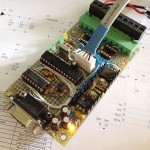
Tag: hammer
A New Hammer
“I suppose it is tempting, if the only tool you have is a hammer, to treat everything as if it were a nail.” – Abraham Maslow
The above statement is an adage that goes a long way to explaining many engineering decisions. Often referred to as Maslow’s Hammer it is a concept that has been well understood in science and technology for a very long time. In engineering we tend to use the tools we know to solve every problem in front of us, even if the tools we have may not be the best solutions.

Or the old tools are simply obsolete and you are forced to update.
I am as guilty as any engineer in this. The major example, at least in my case, are microcontrollers. For many decades I have used Microchip PIC16F controllers each time I encountered a problem that required some form of complex control. Specifically I have always loved the PIC16F73 and the later PIC16F873 parts. they had everything I usually needed… A serial port, plenty of I/O pins, a few channels of 10-bit analog to digital, a convenient 28 pin DIP package. If I needed more I/O or more memory just step up to one of the larger packages like the PIC16F876.
Then Microsoft Windows 7 happened. How is this even related? The old versions of MPLAB I used to write the software and program the parts does not run of 64-bit Windows 7. When I updated my machine, I was forced to update to MPLAB X, a totally different platform. A new hammer to learn.
